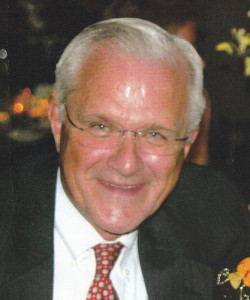My father didn’t respect a lot of attorneys because he believed that, as a lot, they were rotten. But there were a few he did. One of those guys was Daniel P. Stefko – “Dan.”
My father and Dan met working on a tricky construction delay case based in Atlantic City around the time I entered law school. I was in Hilton Head with my father when I met Dan. And by met, my introduction came in the way of a brief that Dan had co-authored on the construction delay case.
“Jay, do you want to know my test for an attorney?” My father said as he handed me the brief. Whether I wanted the answer or not, I was going to get it.
“Would I want this guy defending me if my life was on the line?” He stated that not as a question, but as an assertion. “Dan is one of the guys that passes that test, and very, very few do. You should send him a resume and return to Pittsburgh to work with Dan if he will have you. Because if you want to be one of the guys that passes my test, you need to learn from someone that already does.” My father saved the most important part for last, as he usually did.
“Oh yeah, and he is honest too, something that seems rare in the legal business. So he proves you can be honest in the profession and still be one of the greats.”
Before my interview with Dan, my father had told me about his icy eyes, booming voice and imposing presence (as if I didn’t already have enough to be nervous about). I had already imagined him a modern day Clarence Darrow, or perhaps a notoriously tough Socratic interrogator like Boston University’s Professor Rickman.
Of course I was sweating when I first met Dan. And then he looked at me with those icy blue eyes – ones that transfixed people into telling the truth – I stood there motionless, not even extending my hand to shake his. It was then that he shook my hand and pulled me in for his patented “long-lost uncle half hug.” Everyone that Dan cared about knew that handshake – because it was the first way that he made you know he cared about you – and that he would look out for you. It all started with those eyes – and that handshake. That handshake just sucked you in, and as he hugged you, you realized how solid a man he was – a man who regularly exercised in private, and who resultantly looked a lot younger than he really was.
I did a lot of work for Dan over the years, grinding away at the trade, learning as much as I possibly could from him. Even with people helping him (me included), Dan was one of the partners that I routinely saw in the library. He liked to do his own research because he said it kept him sharp. Dan was one of the guys setting the standards for the young attorneys, proving that no matter how many books identified someone as one of the “best attorneys,” titles didn’t win cases, hard work did.
As general counsel of our firm he also led with his ethics. He promoted equality in the workplace, especially for all minorities, including gays and lesbians long before that was the politically correct thing to do. Dan also set the standard that everyone was required to tell the truth. What Dan preached made sense to me because those were the same things my own father had taught me – so I listened (even if he didn’t always think I did).
Dan believed that the law was a noble profession. Those that listened to him learned that there were no exceptions to telling the truth. If you needed to lie to win, then you surrendered instead. Dan was the kind of guy that handed over the bad documents, and then settled the case. That was Dan’s integrity, always doing right by the client because, in the long run, he believed that telling the truth was always better than covering things up.
After I left the defense practice for predominantly plaintiff work, Dan and I had a number of cases against each other. Ultimately, one of those cases turned into an incredibly tense affair where it felt like everyone had nukes pointed at each other. Despite that level of intensity, Dan and I had been able to work on the case together professionally.
Even so, when my partner Bob and I headed to the courthouse for a settlement conference on the case, it felt a lot more like we were attending a nuclear summit with Dan as the opposing negotiator. Despite his client’s hostility towards us, Dan still greeted me with his signature handshake – pulling me in close, and reminding me of how I felt about him – one of my mentors. I have had a few fathers in the practice of law – and he was certainly one of them.
That day, in private, we duked it out before the Judge, jabbing each other about the strengths and weaknesses of our respective cases. Nothing went in the right direction, and when we left the Judge’s chambers, we were all a bit heated. The case hadn’t settled, with tensions running high.
As I said goodbye to Dan, he asked that I speak with him privately. Despite both of us being in obviously agitated moods (I liked to joke to Dan that I inherited he and another of my mentor’s tempers), we agreed to speak.
It was when Dan asked me to sit next to him on a courtroom bench that I realized what he was about to deliver very bad news. Bob and I had both noted Dan looked pale – but it wasn’t until then that I realized what that meant. And, there, Dan told me had leukemia. Although we both knew what that meant, Dan told me he was going to fight it – and he was going to beat it. And, he added, he was going to keep working. I had heard my own father say the same things to me before pancreatic cancer got him.
Dan kept working and fighting it – and darn well for a long time, I would add. He was fully ready to try that case he had against me. He only asked that if he tired during the trial that I agree to shorter days. “I am getting old,” he joked. We had a nice laugh about that.
And just when I didn’t think that the case could get any more intense, it did – when something unbelievably dishonest occurred. Not much longer I found myself calling Dan in heated anger, wondering if he knew what had occurred and demanding answers. It was at that precise moment that everything could have blown up in everyone’s faces causing massive damage. But the strength of Dan’s integrity prevented that from happening. I respected him, trusted him and followed the advice he gave that day, because he made it clear that he was dealing with the same thing I was dealing with and he didn’t want to see me get hurt.
“I am proud of you,” he said. “But this is a fight for another day, and you need to trust me on that.”
After our near nuclear meltdown, Dan and I continued to have cases together, which gave me an excuse to call him and speak to him about all sorts of things. Although Dan and I hadn’t always seen eye to eye (perhaps he had “trained me too well,” I said which elicited a laugh), we had talked through our differences. And, even though we were adversaries on cases, he continued to give me a lot of good advice along the way – including above all else to just tell the truth.
Dan continued to work, literally, until the day he died – with files at his bedside. Why? I asked him during one of our calls.
“I love the law,” he said. “And I will die doing it, but don’t worry, I don’t plan on dying any time soon.” He was upbeat and said that shortly before he entered the hospital to undergo his final treatments, ones that he didn’t survive.
Almost three years to the day that my father died, on February 11, 2014, Dan Stefko lost his battle with leukemia – and joined my father. The law, our shared jealous mistress, had me clear across the country when it happened.
Dan was a devout man of faith survived by a very large family. Included are his wife, children and grandchildren (of which there are many), as well as his extended family through the law – me included. It is through all of us that his legacy continues. Dan’s official obituary can be found here. Thank you Dan.

